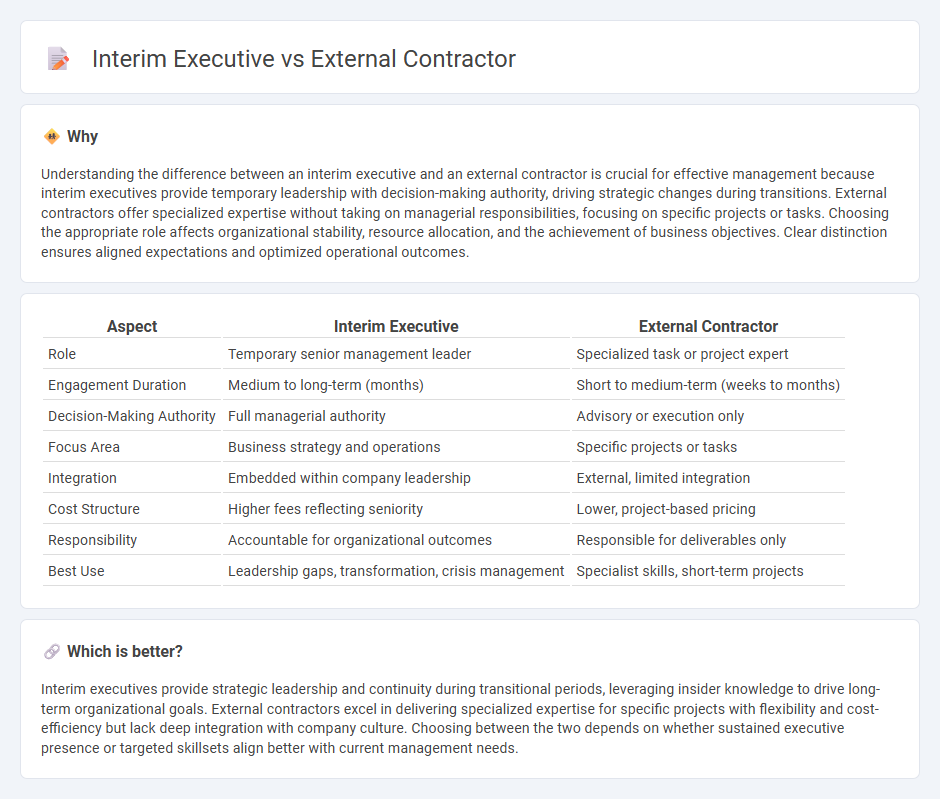
Interim executives provide strategic leadership during transitional periods, bringing industry expertise and decision-making authority tailored to company objectives. External contractors offer specialized skills for specific projects without long-term integration into the organizational hierarchy. Discover the key differences and benefits of engaging interim executives versus external contractors to optimize your management strategy.
Why it is important
Understanding the difference between an interim executive and an external contractor is crucial for effective management because interim executives provide temporary leadership with decision-making authority, driving strategic changes during transitions. External contractors offer specialized expertise without taking on managerial responsibilities, focusing on specific projects or tasks. Choosing the appropriate role affects organizational stability, resource allocation, and the achievement of business objectives. Clear distinction ensures aligned expectations and optimized operational outcomes.
Comparison Table
| Aspect | Interim Executive | External Contractor |
|---|---|---|
| Role | Temporary senior management leader | Specialized task or project expert |
| Engagement Duration | Medium to long-term (months) | Short to medium-term (weeks to months) |
| Decision-Making Authority | Full managerial authority | Advisory or execution only |
| Focus Area | Business strategy and operations | Specific projects or tasks |
| Integration | Embedded within company leadership | External, limited integration |
| Cost Structure | Higher fees reflecting seniority | Lower, project-based pricing |
| Responsibility | Accountable for organizational outcomes | Responsible for deliverables only |
| Best Use | Leadership gaps, transformation, crisis management | Specialist skills, short-term projects |
Which is better?
Interim executives provide strategic leadership and continuity during transitional periods, leveraging insider knowledge to drive long-term organizational goals. External contractors excel in delivering specialized expertise for specific projects with flexibility and cost-efficiency but lack deep integration with company culture. Choosing between the two depends on whether sustained executive presence or targeted skillsets align better with current management needs.
Connection
Interim executives and external contractors both play crucial roles in providing specialized management expertise during transitional periods or specific projects. Interim executives temporarily assume leadership roles to maintain operational continuity, while external contractors deliver targeted skills and solutions without permanent employment ties. Their collaboration enhances organizational agility by combining strategic decision-making with flexible, project-based execution.
Key Terms
Outsourcing
Outsourcing to an external contractor involves hiring specialists for specific projects or tasks, allowing flexibility and cost savings without long-term commitments. Interim executives are temporary leaders placed within an organization to drive strategic change and provide stability during transitions, often bringing industry expertise and executive decision-making. Discover how outsourcing choices impact business agility and performance by exploring the roles of external contractors and interim executives.
Temporary Leadership
External contractors provide specialized skills for project-based tasks without long-term commitment, while interim executives assume temporary leadership roles to drive strategic change and operational continuity during transitions. Interim executives offer deep industry expertise and decision-making authority to maintain leadership stability, whereas external contractors typically handle specific functional roles. Discover how choosing between these options can impact your organization's temporary leadership success.
Organizational Integration
External contractors typically provide specialized skills for specific projects without deep integration into the company's culture or long-term operations, often working independently from internal teams. Interim executives assume leadership roles within the organization, driving strategic initiatives while fully embedding into executive decision-making processes to influence organizational culture and operational alignment. Explore how choosing between these roles can impact your company's organizational integration and long-term success.
Source and External Links
External Contractor Definition - An external contractor is defined as any third-party individual or entity hired to provide goods or services for a specific project or event, often under a contract with the client.
Building Team Culture with External Contractors - This resource discusses how to create a unified team culture between internal and external contractors, highlighting reasons like scaling and accessing specialized expertise.
Top 5 Reasons Companies Should Hire External Contractors - This article outlines reasons such as faster hiring, proactive problem-solving, and knowledge sharing as benefits of hiring external contractors.
 dowidth.com
dowidth.com